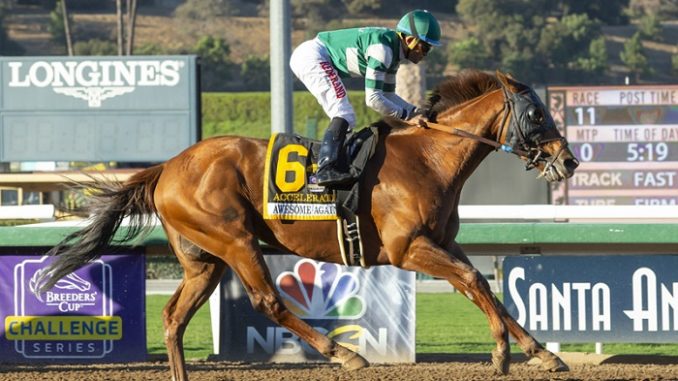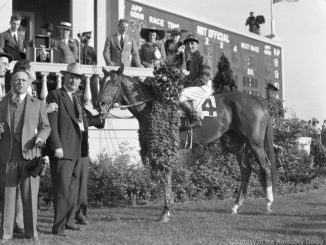
Even before Accelerate woke up the morning of November 3, there were already preemptive strikes from several quarters in the racing media arguing that even if he prevailed that afternoon in the Breeders’ Cup Classic (G1), the retired Justify would still be entitled to 2018 Horse of the Year honors on the basis of becoming the sport’s 13th Triple Crown winner in June. Because, you know, that’s the way it’s always been and always should be.
“Oh, yes, the fight for the soul of the history of Thoroughbred racing in the United States is also at stake [in the Breeders’ Cup Classic],” wrote Daily Racing Form‘s Mike Watchmaker, which he admitted was a bit hyperbolic.
Several passages in Watchmaker’s Saturday column stood out, but here’s the crux of his argument:
Even if Accelerate completes a fantastic season with a win in the Classic, voting against Justify for Horse of the Year could dangerously devalue the Triple Crown, certainly in a present sense, and quite likely in a past sense, too. If Justify were not Horse of the Year, would prior Triple Crown winners be viewed with the same reverence? I mean, no offense to the Breeders’ Cup, which is tremendous in many ways. But the Triple Crown is the best thing American racing has, and seeing it diminished in any fashion frankly scares the heck out of me.
In other words, maintaining the perceived sanctity of the Triple Crown is more important than rewarding an arguably more qualified candidate.
In late August, I made the point that Accelerate should be given serious consideration for Horse of the Year honors if he were to run the table the rest of the season. He’s now done that. This was the crux of my argument of why this should be:
The first is a reminder that as difficult and rare as a Triple Crown sweep is and has been, we’re talking about a series restricted to three-year-olds, closer in equivalency to the USGA Junior Amateur Championship than the U.S. Open. This is not to deny that the racing season most everywhere generally revolves around what happens with the classic generation. It’s just that a lot of very good horses are unable to state their case on those stages due to ineligibility.
I later reviewed the history of year-end polling involving several post-1936 Triple Crown winners that didn’t happen to beat older horses the same season, concluding that past voters had erred awarding Affirmed the title in 1978 despite proving inferior to older champion Seattle Slew on the racetrack. If a mere seven voters had chosen Seattle Slew instead of Affirmed, the current debate between Justify and Accelerate would have a vastly different look to it.
There is simply no evidence to support the notion that the Triple Crown series will be diminished in any way if a majority of Eclipse voters do not back Justify. Its relative popularity within racing and outside of it will generally endure based on established criteria like attendance, handle, and comparative television ratings with other races and competing sporting events.
A Justify victory, though, would continue a more disturbing and worrisome trend.
From 1936 through 1996, a span of 61 seasons, only five years resulted in a consensus Horse of the Year being named that did not win at least one stakes open to all comers. A two-year-old Secretariat was voted on top in 1972, and the others were the Triple Crown years of Whirlaway, Count Fleet, Seattle Slew, and Affirmed. And Whirlaway lost to fellow three-year-olds in his open company losses.
While that fact might support the argument that a Triple Crown sweep is indeed bigger and more important than success in open company, the overwhelming belief of voters for those six decades was that what you did against open company was of far, far greater importance that what you did in races restricted by age and/or sex.
However, since 1997, we’ve had six Horses of the Year who did not win a single stakes open to all comers (four of them either didn’t try or couldn’t). In no case were there no logical or superior alternatives. Justify would be the seventh, a rapid increase in just the last 22 years. This trend is not so surprising, though, when you consider how pre-Breeders’ Cup inter-generation competition in this country has become actively discouraged from a timing and monetary standpoint.
While their counterparts in Europe are stepping up to run against their elders in summertime races like the Eclipse (G1), King George VI and Queen Elizabeth (G1), Sussex (G1), Juddmonte International (G1), and Prix Jacques le Marois (G1), lucrative races like the Haskell Invitational (G1) and Travers (G1) are being run later in the season than they were a generation ago. The recent elevation in stature of the Pennsylvania Derby (G1) and Cotillion (G1) has also had a negative impact on time-honored races like the Woodward (G1), Jockey Club Gold Cup (G1), Beldame (G1), and Spinster (G1), all of which often showcased noteworthy clashes between the generations.
Accelerate is no all-time great and probably won’t deserve a spot in the Hall of Fame, but in no case was any horse three years of age or up denied a chance to race against him, though he himself was denied an opportunity to compete in the three most popular races on the 2018 calendar. If Justify shouldn’t be “penalized” for winning the Triple Crown, as some think he would be, Accelerate shouldn’t likewise be penalized for not being eligible for them.
As reflected in recent Horse of the Year balloting, the continued devaluing of success in open stakes company is greatly lamentable. It’s not scary because it’s reality, yet its diminishing is something to get much more worked up and vocal about.



You make a point that is difficult to argue. Accelerates only loss this year was by a neck to another breeders cup winner. Five grade 1 wins in a year is an incredible accomplishment. Horse of the year should go to the best horse not to an instituion. If I had a horse of the year vote it would go to accelerate
I usually never comment on what is posted here. However Justify was really special. won four grade ones in what a little over 3 months. I did think He was vulnerable after Belmont win but He was retired. probably rightly so considering His Stud value. Accelerate was a favorite last year in the dirt mile and didn’t show up. really He beat weak competition in California and not a stellar cast in the classic. He is a good Horse but not Horse of the year.
Agree 100%. Should also point out that the three-year-olds Justify beat in the Triple Crown were a bunch of bums. Where did McKinzie and Catholic Boy finish in the Classic???? 12th and 13th as the second and third choices. And Bravazo was not even good enough to run in the Classic. I rest my case.
As good as Justify’s record is, I find it hard to believe that the fields he beat will be much of a factor next year in the handicap division in 2019, should they run.
Accelerate, took on ALL comers and reigned supreme.Certainly, in my mind,
Justify did not leave me as excited as American Pharoah.